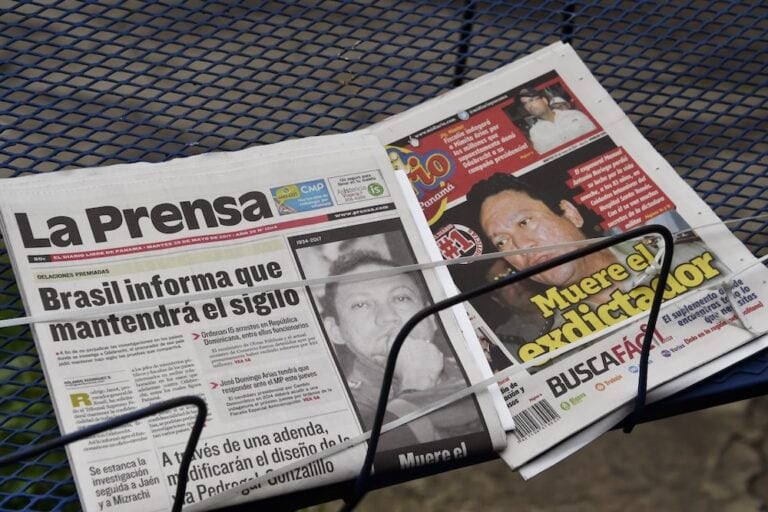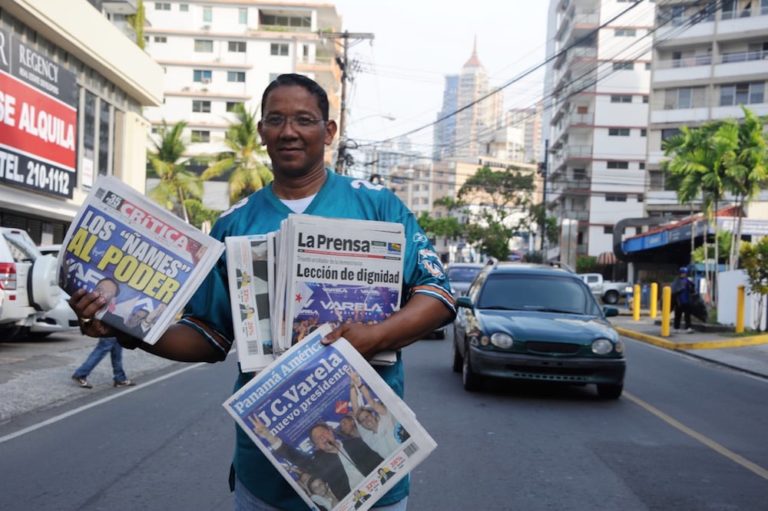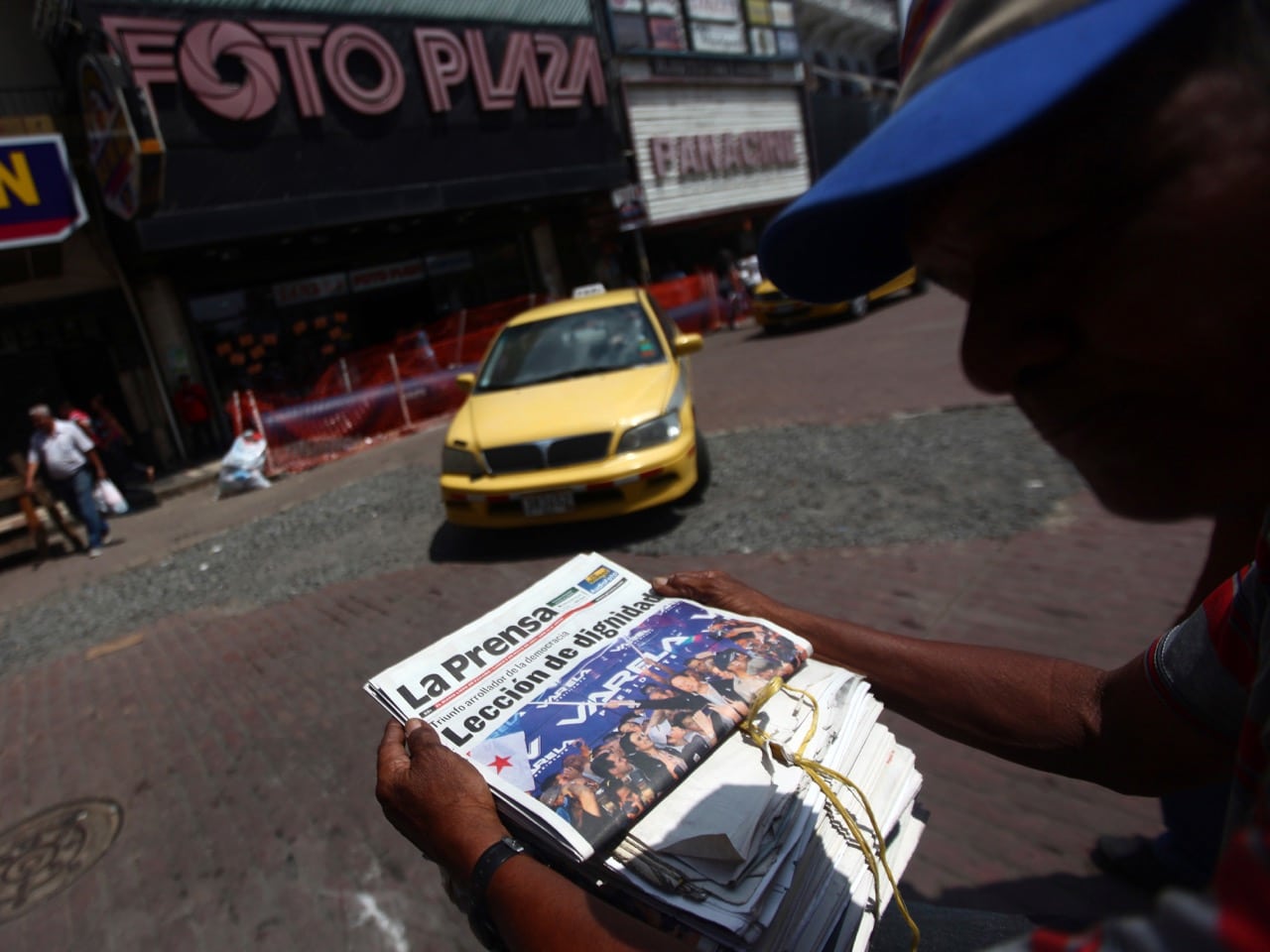(RSF/IFEX) – In a letter to President Mireya Moscoso, RSF expressed concern over two bills that are currently being debated. The first would oblige journalists to adopt a “code of ethics” which would again put into question journalists’ right to protect their sources. Were it to be adopted, this law would also stipulate that one […]
(RSF/IFEX) – In a letter to President Mireya Moscoso, RSF expressed concern over two bills that are currently being debated. The first would oblige journalists to adopt a “code of ethics” which would again put into question journalists’ right to protect their sources. Were it to be adopted, this law would also stipulate that one must possess a degree in order to practice journalism and would discriminate against foreign journalists. “We ask you to do everything in your power so that these provisions are eliminated and the bill upholds the ideals expounded in the Declaration of Principles on Freedom of Expression adopted by the Inter-American Commission on Human Rights (IACHR),” urged RSF Secretary-General Robert Ménard. Article 6 of the declaration states that “compulsory membership or the requirements of a university degree for the practice of journalism constitute unlawful restrictions of freedom of expression. Journalistic activities must be guided by ethical conduct, which should in no case by imposed by the State.” Furthermore, Article 2 stipulates that “all people should be afforded equal opportunities to receive, seek and impart information … without any discrimination,” whereas Article 8 notes that each journalist has “the right to keep his/her source of information, notes, personal and professional archives confidential.”
A second legislative initiative on the right to respond is aimed at protecting individuals’
“honour, reputation and good name.” “As it reads now, this bill could result in subjective and arbitrary interpretations,” stated a concerned Ménard. RSF asked Moscoso to ensure that this law complies with the Munich Charter, which stipulates that journalists have a responsibility to rectify published information when this is subsequently “proven to have been incorrect.” Finally, RSF expressed its preoccupation over the president’s orders to the attorney general to ask journalists who report on cases of corruption to provide proof of their accusations. “We must be careful that this process does not jeopardise the right to protect sources, nor that it be used as an intimidation tactic against investigative journalists,” noted Ménard. Ménard recalled that the attorney general has been behind a number of complaints filed against journalists.
According to information collected by RSF, on 20 June 2001, President Moscoso asked Attorney General José Antonio Sossa to launch an investigation into cases of corruption reported by the press. The attorney general was asked to ensure that journalists who bring such cases to light provide evidence for their accusations. “We cannot permit that we in the government continue to be told that we are all corrupt,” Moscoso remarked. Sossa has filed approximately seventy complaints for “defamation” or “insult” (“desacato”) against a number of journalists. Under Panamanian legislation, both these crimes are punishable with prison sentences. At the end of July 2000, Sossa ordered that Carlos Singares, director of the newspaper “El Siglo”, be sentenced to eight days in prison for showing a lack of respect. “El Siglo” had published a lawyer’s statements accusing Sossa of engaging in pedophile activity (see IFEX alerts of 27, 21 and 7 July, 30 and 26 June and 31 May 2000).
According to additional information collected by RSF, at the end of May 2001 Minister of the Interior and Justice Winston Spadafora put forth draft legislation, Article 7 of which restricts the granting of accreditation to those journalists who are in possession of a journalism degree. Furthermore, Article 8 of the bill denotes that foreign journalists would only be able to work for a Panamanian medium when the position in question cannot be filled by a Panamanian and for no more than one year. Article 11 stipulates that “all positions whereby the journalist is legally responsible for information distributed in the media will only be occupied by journalists of Panamanian nationality.”
In Article 22, the draft legislation also considers the adoption of a “code of ethics” for the press, which renders the right to protect sources of information subject to the condition that the journalist is not “being tricked or manipulated.” Were the bill to be passed, journalists would be prohibited from publishing confidential information and would be required to refuse documents on activities which are punishable by law. Finally, journalists would be required to comply with the courts’ order to reveal their sources of information when the matter in question is subject to criminal proceedings. Furthermore, the bill put forth by the minister of the interior considers the creation of a High Press Council, whose function would be to grant journalists accreditation and punish those who do not act according to the code of ethics. A representative of the Ministry of the Interior and Justice would be a member of such a body.
Finally, a second bill, presented before the National Assembly on 16 May, considers that all persons who feel that “their honour, reputation and good name” are jeopardised by the publication of “erroneous, defamatory, insulting or offensive” information, can demand a right of reply or that a correction be issued. RSF recalls that the Munich Charter established that journalists have the responsibility to “rectify all information” solely when such information is “proven to have been incorrect.” The charter, adopted in 1971 by a number of journalists’ organisations, lists journalists’ rights and obligations.


